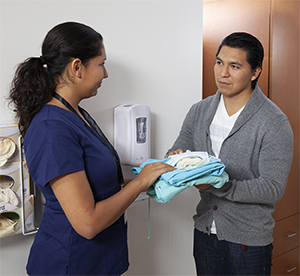Certain infections can spread from person to person. This is why your friend or family member may be put in a special room. Restrictions may be placed on who can go in and out of that room and what protection must be worn. This is for your protection and your loved one’s protection. Read this sheet to learn more.
How infection spreads
Infection is caused by germs. An infected person carries germs that they can give to others. Even a person who doesn’t feel sick can still carry and spread germs. Germs can cause infection by traveling through the air. They can also cause infection by direct contact or on the surface of objects, such as a door handle, TV remote control, phone, bed railing, or tabletop. The rules about who can visit your friend or family member, and when they can visit, depend on what kind of infection they have.
Precautions help prevent the spread of infection
To stop infection from spreading, health care workers may do one or more of the following:
-
Place an infected person in a private room, or in a room with others who have the same infection. (This depends on what kind of infection the person has.)
-
Place restrictions on who can enter and exit this room.
-
Wear a mask and eye protection or a face shield, gloves, gown, or other items, and ask you to do the same when you visit.
-
Wear an air filter (respirator) for some infections, and ask you to do the same when you visit.
What you can do
-
You may be asked to wear a mask and eye protection or a face shield, gloves, gown, or other items when you visit. Follow any instructions carefully.
-
Practice good hand hygiene. This means washing your hands with soap and clean, warm, or cold running water for at least 20 seconds. Or using a 60% alcohol-based hand sanitizer. This is especially important after you use the bathroom and before and after touching the person or their surroundings.
-
Keep your hands away from your face.
-
Cough or sneeze into a tissue. Then throw the tissue away and wash your hands. If you don't have a tissue, cough or sneeze into your elbow.
-
Don't use the person’s bathroom.
-
Don't visit someone if you feel sick. Don't visit if you have been exposed to an illness such as the flu, COVID-19, chickenpox, or measles.


